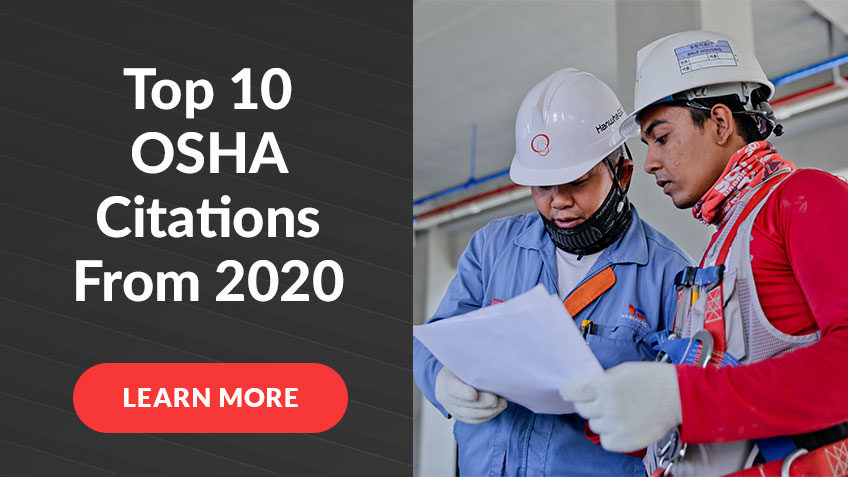
Top 10 OSHA Citations From 2020
Here’s a closer look at the data from last year showing the most common cited violations by OSHA and how your business can take proper measures to avoid these all too common fines.
#1 FALL PROTECTION
For the tenth consecutive year, fall protection finds itself number one on the list. Falls are the number one cause of injuries and deaths amongst employees. It is critical for businesses to instill better awareness and safety practices in their workforce. Regular onsite inspections by qualified personnel should be implemented in order to check for holes, slippery surfaces or other tripping hazards.
#2 HAZARD COMMUNICATION
Many workplace citations could be avoided through better training programs, proper labeling and warnings. Your business should regularly educate employees on safety awareness. Having a safety protocol in place can help make your working environment a safer place for everyone.
#3 RESPIRATORY PROTECTION
If your business deals with dangerous chemicals or particles, it is extremely important to not only provide adequate equipment to protect the health of your workers, but also educate them on proper precautions and protocols in order to stay safe. We recommend scheduling annual medical evaluations as well as fit tests.
#4 SCAFFOLDING
Improper decking and planking or the lack of tipping restraints can lead to catastrophic failures and dangerous situations. We recommend performing daily inspections of the structure by qualified personnel to ensure maximum safety.
#5 LADDERS
Bad ladder safety practices can be deadly. Never place a ladder on a step, split loads into multiple trips and always wear personal protection.
#6 LOCKOUT TAGOUT
Operating dangerous machinery should always come with rigorous safety training on maintenance and operational procedures. Always make sure to keep your staff up to date on current practices and to train new employees.
#7 FORKLIFTS
Forklifts are a common cause for accidents and citations amongst warehousing, manufacturing and recycling industries. Employees should be trained and qualified to safely operate and maintain the vehicles. We recommend regular safety training and maintenance programs to ensure awareness at all times.
#8 FALL PROTECTION TRAINING
Falls are the #1 cause of injuries and deaths in the workplace, and many of them could be avoided by more thorough training and protocols. These training should be re-evaluated on an annual basis.
#9 PPE (PERSONAL PROTECTION EQUIPMENT)
Employers should provide eye and face protection when required along with formal training programs. Businesses are also responsible for storage and cleaning of the equipment.
#10 MACHINE GUARDING
Machine guarding includes, blade protection, securing and fixing machines to floor/walls to avoid tipping, protecting employees against dangerous debris or contraptions.
Our partnership with OutlookHR can help you design a custom safety program tailored to your business needs. Get access to safety webinars, phone consultations, online safety evaluations, and over 1,000 interactive PDFs in English and Spanish as part of our CORE Safety Program. We can also provide on-site instructor safety training and regular inspections. We want to help you focus on what you do best, and let our experts protect your business from Cal / OSHA citations through better safety management.
We don’t just provide you with a one size fits all solution, we match you with an HR package tailored to your business needs.
About OutlookHR
Human Resources play a key role in the organization’s understanding of the latest labor laws,
lawful recruitment and hiring practices, mandatory trainings and bookkeeping of up-to-date employee
handbooks and workplace notices. Our partnership with Colony West puts us at the forefront of the latest
changes in local, state and federal labor laws to ensure your company is never at risk.
